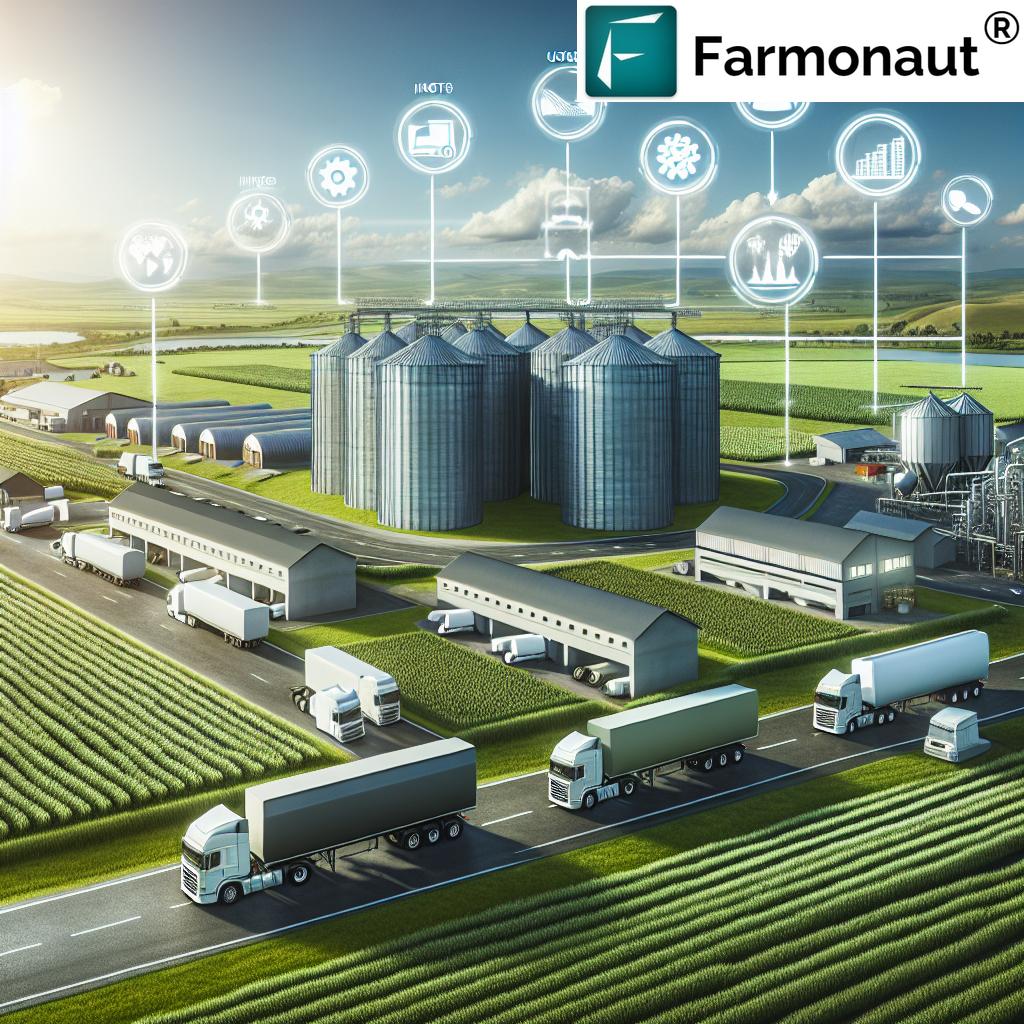Agribusiness Strategy: 7 Secrets for Massive Growth
“Top agribusinesses using market analysis report 30% higher growth rates than those without strategic planning.”
Summary: Understanding Agribusiness Strategy
Agribusiness strategy is the cornerstone of success and resilience in today’s evolving agricultural sector. It encompasses our comprehensive planning and execution of activities across farming, forestry, and allied domains to drive sustainable growth, profitability, and adaptive capacity. Our approach extends beyond traditional production to the integration of business functions—including production, marketing, finance, and human resources—with modern agricultural practices.
We understand that maximizing efficiency and meeting the dynamic demands of consumers requires the thoughtful interplay of market analysis, technology adoption, risk management, and sustainability. Success in agribusiness, whether for smallholder farming operations or large-scale enterprises, is achieved by blending innovation, data-driven decision-making, and a keen awareness of market and environmental trends.
Farmonaut empowers us with pioneering precision agriculture technology and actionable insights. Our tools harness satellite-driven crop health monitoring, AI-based recommendations, blockchain-powered traceability, and sustainability metrics, making advanced agribusiness strategies accessible and affordable to all.
Key Components of a Successful Agribusiness Strategy
Developing a successful agribusiness strategy requires mastery over a range of interrelated domains. The following core elements constitute the pillars of sustainable agriculture practices and robust business growth in the agricultural sector:
- Market Analysis and Demand Forecasting
- Diversification and Value Addition
- Supply Chain Optimization
- Risk Management in Farming
- Sustainability and Innovation
- Strategic Partnerships and Collaborations
- Brand Development and Marketing
- Policy Advocacy and Compliance
1. Market Analysis and Demand Forecasting (Focus Keyword: Market Analysis in Agribusiness)
The agricultural market is highly dynamic, influenced by seasonal shifts, global trade, climate trends, technology disruption, and consumer preferences. Market analysis in agribusiness empowers us to identify growth opportunities and anticipate risks with greater precision.
- Strategic insights: By studying market demands, trends, and consumer needs, we align our business decisions with profitable opportunities.
- Forecasting: Data-driven demand forecasting enables us to optimize production planning, reduce wastage, and remain agile in the face of price fluctuations.
- Competitive advantage: By staying ahead of emerging agricultural technologies, we can deliver value-added products that stand out.
Farmonaut’s satellite-based crop health monitoring and AI-driven forecasting tools bring cutting-edge analysis to our operations. With real-time access to NDVI, soil moisture, and weather intelligence, we gain a competitive edge for effective planning and execution.
Did you know? Our large-scale farm management solution combines advanced remote sensing, data analytics, and centralized fleet and field management, giving us a holistic view of our agribusiness for superior strategic planning.
2. Diversification and Value Addition (Focus Keyword: Diversification in Agribusiness)
Diversification in agribusiness is a resilience strategy with a direct influence on growth and risk mitigation. By expanding our product offerings and exploring new markets, we can:
- Enhance income streams and mitigate dependency on any single crop or commodity.
- Develop value-added products, such as dried fruits, honey, herbal teas, or specialty crops, to capture higher price points and consumer interest.
- Reduce vulnerability to market volatility and climate change impacts.
Trivia:
“Diversified agribusinesses are 2.5 times more likely to withstand market fluctuations than single-crop operations.”
We believe in leveraging advisory platforms that provide insights on optimal crop selection and planting rotations. This allows for thoughtful diversification according to soil, climate, and market conditions, boosting profitability and sustainability.
3. Supply Chain Optimization (Focus Keyword: Agricultural Supply Chain Management)
The agricultural supply chain is an intricate web connecting farms, suppliers, buyers, processors, and consumers. Efficient supply chain management ensures seamless flow of products from the farm to end-markets, reduces operational costs, and enhances value for all stakeholders.
We focus on:
- Sourcing quality inputs: Ensuring seeds, fertilizers, and other resources meet our standards for yield optimization.
- Inventory management: Utilizing technology to monitor stocks and anticipate demands, mitigating losses from spoilage or under-supply.
- Establishing strong supplier-buyer relationships: Building trust-based networks provides stable market access and drives down transaction costs.
Farmonaut’s fleet and resource management tools enable us to track logistics and geolocations of our assets, leading to more efficient deliveries and reduced overhead.
The integration of these agricultural supply chain management practices with real-time data from Farmonaut not only ensures compliance and traceability but also strengthens the transparency of our business.
4. Risk Management in Farming
Volatility and uncertainty are ever-present in agriculture, driven by unpredictable weather, price fluctuations, supply disruptions, and more. Effective risk management in farming is vital to ensuring both business continuity and resilience.
- Identifying risks: We proactively analyze environmental, operational, and financial risks using real-time data from Farmonaut’s platform.
- Diversification: Reducing risk by allocating resources across crops, markets, and supply channels.
- Insurance: Satellite-based crop verification provided by Farmonaut simplifies crop loan and insurance applications, expediting claims and enhancing access to financial products.
- Contingency planning: We develop robust risk mitigation plans to address operational and environmental uncertainties, including climate change adaptation and disaster preparedness.
Applying precision agriculture, remote sensing, and advanced analytics, we minimize losses and optimize our financial returns.
5. Sustainability and Innovation (Focus Keyword: Agricultural Innovation and Sustainability)
Sustainable agriculture practices and ongoing innovation are essential for long-term sector viability and societal well-being. Our commitment includes:
- Adopting precision agriculture technology such as satellite imagery, GPS-directed field operations, and AI-based resource recommendations to boost productivity and lower input use.
- Integrating carbon footprinting tools for monitoring, reporting, and improving our environmental impact, ensuring regulatory compliance and brand credibility.
- Promoting sustainable land and resource management to meet eco-friendly standards and attract environmentally conscious consumers.
Our use of Farmonaut’s technology also enables real-time monitoring for soil health, water conservation, pest management, and more. This approach positions us ahead in both regulatory compliance and marketplace preference.
6. Strategic Partnerships and Collaborations
Forming alliances within the agricultural ecosystem accelerates innovation and extends our market reach. We actively:
- Engage with technology providers for access to emerging tools and data.
- Participate in research and knowledge sharing networks for best practices and innovation.
- Work with trusted stakeholders to pool expertise and achieve operational excellence.
Our engagement with advanced agritech platforms and professional communities fosters the development of scalable, adaptive business models that thrive in the face of economic and environmental change.
7. Brand Development and Marketing (Farm Marketing Strategies)
A notable brand presence and smart farm marketing strategies distinguish us in crowded markets. We leverage:
- Digital marketing for direct-to-consumer engagement and retention.
- Storytelling around our sustainable agricultural practices for differentiation.
- Use of blockchain-based traceability to demonstrate supply chain transparency, boosting consumer trust and loyalty.
- Automated inventory and production tracking to present real-time availability and provenance to markets and retail partners.
Modern consumers value traceability and eco-friendly brand values, both of which we prioritize through technology-driven marketing and communication channels.
8. Policy Advocacy and Compliance
Navigating the complex landscape of agricultural policy is fundamental for operational stability and regulatory compliance. This includes:
- Keeping abreast of laws, subsidies, and regulations impacting production, export, sustainability, and traceability.
- Engaging in advocacy efforts that create more favorable policy conditions for the agricultural sector at large.
- Ensuring compliance with food safety, sustainability, and labor standards, enabled by robust reporting and data analytics.
Strong policy advocacy and vigilant compliance position our agribusiness to benefit from new opportunities and avoid costly disruptions.
Strategy-Impact-Estimated ROI Comparison Table
| Strategy | Description | Estimated Implementation Cost | Estimated Time to See Results | Estimated ROI (%) |
|---|---|---|---|---|
| Market Analysis & Demand Forecasting | Analyzing market trends, consumer needs, and price fluctuations to optimize production and sales decisions. | $1,000–$5,000/year (tech and research) | 3–6 months | 20–40% |
| Diversification & Value Addition | Expanding product lines and adding value for increased income and market reach. | $2,000–$20,000 (depends on scale) | 6–18 months | 35–80% |
| Supply Chain Optimization | Enhancing the agricultural supply chain with logistics tracking and inventory management technology. | $1,500–$10,000/year | 3–9 months | 30–50% |
| Sustainable Practices & Innovation | Implementing advanced sustainable agriculture tech and eco-practices to improve yields and brand value. | $500–$8,000/year | 6–12 months | 25–60% |
| Technology Adoption | Investing in precision agriculture, AI, and IoT tools for higher productivity and resource savings. | $1,500–$7,000/year | 3–9 months | 15–40% |
| Risk Management | Implementing risk assessment, insurance, and diversification strategies to buffer against losses. | $300–$2,000/year | 6–18 months | 10–30% |
| Strategic Partnerships | Collaborating with stakeholders for shared tech, knowledge, and market access. | Minimal to $10,000 (based on initiatives) | 12–36 months | 40–75% |
Implementing Agribusiness Strategies for Success
Turning our strategic plans into actionable results requires careful execution and a commitment to continuous improvement. Here’s how we bridge strategy and success:
- Comprehensive Market Research: Continuously analyze consumer trends, competitor activities, and global dynamics.
- Investment in Technology and Innovation: Adopt precision agriculture technology and digital solutions for efficiency and productivity.
- Robust Risk Management Plans: Use geospatial and AI-enabled analysis for timely risk identification and mitigation.
- Relationship Building: Cultivate strong, transparent relationships with key stakeholders, including suppliers and buyers.
- Focus on Continuous Improvement: Regularly review KPIs, market shifts, and operational workflows to stay ahead.
- Data-Driven Decision-Making: Rely on real-time data, scenario modeling, and predictive analytics for strategic agility.
We recommend leveraging Farmonaut’s satellite imagery and weather API (API Developer Docs) to integrate farm intelligence directly into your agribusiness systems—enabling personalized dashboards, automated alerts, and seamless reporting.
Farmonaut Subscription Packages
Affordable precision agriculture solutions are available for farms and agribusinesses of all sizes. Choose a subscription that fits your operational needs, from real-time monitoring to advanced advisory and compliance tools.
Precision Agriculture Technology with Farmonaut
Farmonaut revolutionizes modern agribusiness management by democratizing access to advanced agricultural innovation and sustainability solutions previously reserved for large enterprises. With robust, feature-rich platforms available on Android, iOS, and web, we offer our clients:
- Satellite-Based Crop Health Monitoring: Real-time NDVI, soil moisture, and weather data for timely, informed farming decisions.
- Personalized AI-Driven Advisory (Jeevn AI): Receive crop-specific guidance, weather prediction, and management strategies, boosting efficiency and productivity.
- Blockchain-Based Traceability: Prove the origin and journey of your agricultural products to enhance transparency and consumer trust. Learn more about Product Traceability.
- Resource & Fleet Management: Reduce costs and optimize logistics by tracking vehicles, equipment, and personnel from a single dashboard. Explore Fleet Management.
- Carbon Footprinting: Track and reduce your environmental impact, ensure regulatory compliance, and appeal to sustainability-focused consumers. See Carbon Footprinting Tools.
Our technology-driven approach enables efficient agricultural supply chain management, operational optimization, real-time decision support, and sustainability reporting, delivering transformative value to every agribusiness, from individual farmers to corporate clients.
FAQs: Agribusiness Strategy, Sustainable Practices & Modern Technology
What is an agribusiness strategy and why is it important?
Agribusiness strategy involves the comprehensive planning and execution of business activities across the agriculture and forestry sector. It is essential for maximizing profitability, supporting sustainable growth, improving resilience to risks, optimizing resource use, and meeting evolving market demands.
How does market analysis impact agricultural business growth?
Market analysis in agribusiness allows us to identify consumer trends, forecast demand, respond proactively to price fluctuations, and develop products that meet customer needs. This directly contributes to business growth and competitive advantage.
Why is diversification crucial in modern farming?
Diversification in agribusiness spreads risks, generates new income streams, and makes operations more resilient to climate change or market volatility. Diversified farms are far better equipped to withstand external shocks compared to single-crop operations.
How does supply chain optimization benefit agribusinesses?
Agricultural supply chain management improves efficiency, transparency, and cost-effectiveness from input sourcing through to final product delivery. It also ensures compliance and enhances customer trust, especially with traceable and quality-assured products.
What role do technology and innovation play in modern agriculture?
Technological innovation—like Farmonaut’s satellite monitoring, AI-driven advisory, and blockchain traceability—enables us to make better decisions, reduce costs, optimize resource usage, and build sustainable, high-growth agribusinesses.
How can Farmonaut support my agribusiness’ strategy?
Farmonaut equips us with precision agriculture technology, real-time insights, fleet and resource tracking, traceability solutions, and sustainability reporting—all accessible via web, Android, and iOS platforms. Start your journey with Farmonaut here.
Conclusion: Charting the Path for Modern Agribusiness Growth
A well-crafted agribusiness strategy is the vital engine driving sustained success, operational excellence, and growth in the ever-evolving world of modern agriculture. By integrating market analysis, diversification, agricultural supply chain management, risk management in farming, innovation, sustainability, and policy advocacy, we position our businesses to capitalize on market trends while building lasting resilience.
Today’s agribusinesses must embrace continuous learning, digital transformation, and environmentally responsible practices. Farmonaut’s comprehensive suite of precision agriculture technology tools empowers us to streamline operations, boost productivity, meet regulatory compliance, and satisfy the values of 21st-century consumers.
Let’s seize the opportunities of tomorrow with strategic, technology-driven, and sustainable approaches at every level of our agricultural enterprises.














